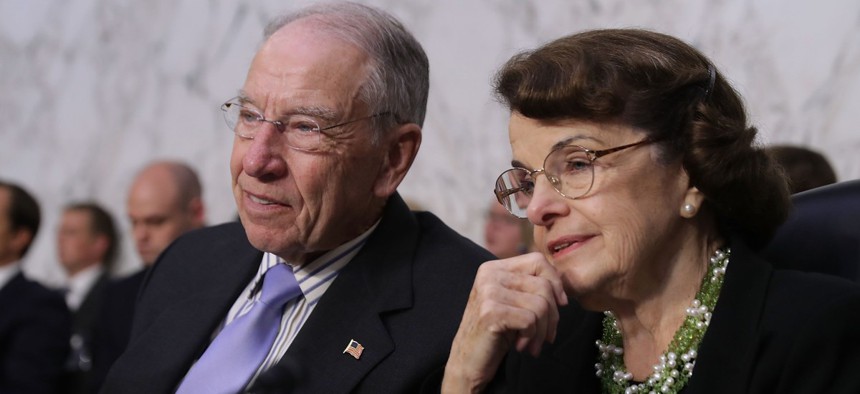Senators Propose Cybercrime Training Center Get 6 More Years of Congressional Support

Sen. Charles Grassley (R-IA) (L) talks with Sen. Dianne Feinstein (D-CA) during the third day of Supreme Court nominee Judge Brett Kavanaugh's confirmation hearing. Chip Somodevilla/Getty Images
Legislation to reauthorize the National Computer Forensics Institute through 2028 comes after House lawmakers passed a similar proposal included in the 2023 National Defense Authorization Act.
As law enforcement officials across the country continue to struggle with growing cyber and electronic crime-related threats, two leading senators are introducing legislation to reauthorize the National Computer Forensics Institute, the nation’s foremost training center for digital forensics.
The federally-funded institute—a partnership between the U.S. Secret Service, the Department of Homeland Security, the state of Alabama and the Alabama District Attorney’s Association—provides law enforcement officials with the training and technical expertise needed to investigate and respond to cyber and electronic crimes, including providing courses on countering ransomware attacks and dealing with encrypted devices. Since opening in 2008, the Hoover, Alabama-based institute has trained law enforcement officers, prosecutors and judges in over 2,500 state and local agencies in all 50 states and U.S. territories.
The National Computer Forensics Institute Reauthorization Act—introduced last week by Sens. Dianne Feinstein, D-Calif., and Chuck Grassley, R-Iowa—would reauthorize NCFI through 2028.
According to the text of the legislation, the institute “shall provide information and training to any state, local, tribal or territorial law enforcement officer, prosecutor or judge; any officer or employee of any agency in any branch of the federal government; any member of the uniformed services; or any state, local, tribal or territorial employee who might reasonably assist in the investigation and prevention of cyber and electronic crime and related threats.”
Grassley said that digital forensics, like those taught at NCFI, have become more vital tools for law enforcement officials to use when solving crimes.
“Since 2008, more than 18,000 people have been trained at the National Computer Forensic Institute to do just that, and 68% of those have been trained in the last five years,” Grassley said in a statement. “It’s clear that the legislation that we sponsored in 2017 has enabled the institute to do a lot of good, and our bill will help it continue to do so.”
Grassley and Feinstein previously drafted legislation in 2017, the Strengthening State and Local Cyber Crime Fighting Act, that authorized NCFI through the end of 2022, after the Trump administration suggested eliminating funding for the institute in its proposed 2018 fiscal year budget.
“Since the National Computer Forensics Institute was first authorized in 2017, law enforcement around the country have benefitted from the training, techniques and skills that it offers,” Feinstein said in a statement. “Our bipartisan bill would ensure NCFI can continue and expand its operations so American law enforcement has the best digital forensics training possible.”
Reps. Elissa Slotkin, D-Mich., Gary Palmer, R-Ala., and Terri Sewell, D-Ala., previously introduced legislation that would reauthorize the institute through 2032. That bill was included in the National Defense Authorization Act for fiscal year 2023 that passed the House last month.






